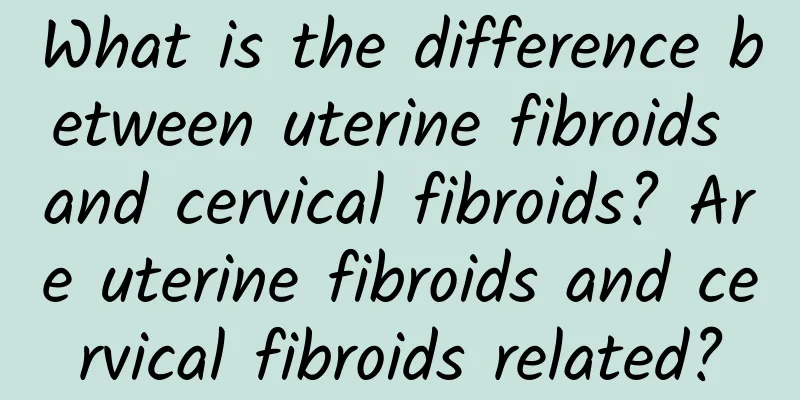What is the difference between uterine fibroids and cervical fibroids? Are uterine fibroids and cervical fibroids related?

|
Uterine fibroids and cervical fibroids are two common gynecological diseases. Although they both belong to the category of fibroids, there are some differences in causes, symptoms, and treatments. This article will introduce the differences between uterine fibroids and cervical fibroids in detail and explore the relationship between them. Uterine fibroids are noncancerous tumors that grow in the uterine wall and are made up of smooth muscle cells beneath the endometrium. Cervical fibroids are tumors that grow on the cervical wall and are also made up of smooth muscle cells. Therefore, the difference between the two is the location of their growth. The symptoms of uterine fibroids and cervical fibroids are also different. Symptoms of uterine fibroids include irregular menstruation, increased menstrual flow, prolonged menstruation, pelvic pain, etc., and sometimes they can cause compression of the urethra and rectum, resulting in urination difficulties and constipation. The main symptoms of cervical fibroids include abnormal vaginal bleeding, especially vaginal bleeding after sexual intercourse. Therefore, intense sexual intercourse may aggravate the bleeding of cervical fibroids. In addition, the two also differ in treatment methods. For uterine fibroids, the treatment method usually depends on the severity of the disease and the female's fertility. Mild uterine fibroids can be relieved by medication. If the symptoms are severe or affect the female's fertility, surgery may be required to remove the uterine fibroids. For cervical fibroids, in general, if the fibroids are asymptomatic and stable in size, special treatment is usually not required. However, if the fibroids cause severe bleeding, surgical removal may be required, or methods such as cryosurgery may be chosen to eliminate the symptoms. In summary, uterine fibroids and cervical fibroids are significantly different in their location, symptoms, and treatment methods. However, it should be noted that both types of fibroids are gynecological diseases and may have a certain impact on women's health. Therefore, it is very important for women to have regular gynecological examinations and maintain good living habits. [Popular Science Introduction] Fibroids are a common benign tumor, mainly composed of smooth muscle cells or fibers. In addition to uterine fibroids and cervical fibroids, there are other types of fibroids, such as ovarian fibroids and fallopian tube fibroids. Female patients are more likely to suffer from fibroids when they are older, and their occurrence is related to genetic factors, hormone levels, and lifestyle habits. The treatment of fibroids varies, depending on the location, size, and severity of the symptoms of the fibroids. For women with fibroids, it is very important to seek medical attention in time and follow the doctor's advice for treatment. |
>>: What kind of surgery can be done for large uterine fibroids? ...
Recommend
Can severe hyperprolactinemia be cured?
Can severe hyperprolactinemia be cured? Hyperprol...
How often should sanitary napkins be changed?
The frequency of changing sanitary napkins is a c...
How to regulate irregular menstruation after IUD insertion? Will IUD insertion cause irregular menstruation?
Neuroendocrine dysfunction, organic disease or dr...
What is abortion? Let's find out.
There are usually two ways to have an abortion. O...
Is it easy for Bartholinitis to recur after the lesion is removed?
There is a soybean-sized gland behind the labia m...
Uterine fibroids may be caused by sexual dysfunction
Uterine fibroids may be caused by sexual disorder...
Brief analysis of the impact of candidal vaginitis on pregnant women
Among female gynecological inflammations, candida...
What are the causes of irregular menstruation?
Menstrual irregularity is a common gynecological ...
Can severe morning sickness lead to miscarriage?
Severe morning sickness can easily cause acidosis...
How much does minimally invasive surgery for pelvic inflammatory disease cost?
How much does minimally invasive surgery for pelv...
What is the cause of cervical erosion in women? Will cervical erosion lead to infertility?
Cervical erosion is a common gynecological diseas...
Why do I have dysmenorrhea?
Dysmenorrhea, a problem that many female friends ...
Let's introduce the clinical symptoms of acute adnexitis
Acute adnexitis is a type of female adnexitis. Th...
How to prevent pelvic peritonitis during menstruation
Pelvic peritonitis is also a type of gynecologica...
Detailed explanation of the symptoms of severe cervicitis
The early symptoms of cervicitis are often ignore...









